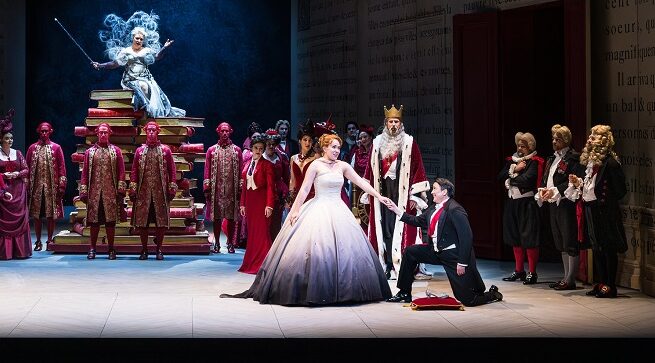
“What a rotter,” actor Toby Schmidt says of his character, Jack, the handsome manipulative husband in the play Gaslight, coming to The Playhouse soon in a production directed by Lee Lewis.
People of a certain age will have known about gaslighting well before it was used as a verb to describe the manipulation of women by men. But many don’t know it comes from Patrick Hamilton’s play, Gas Light and two famous noir films, retitled Gaslight.
Canberra Rep revived the play several years ago, showing that the chills and thrills were still there, so it’s no spoiler to say that the title also refers to what happens when the husband is ratting around upstairs in the Victorian mansion where he and his wife Bella live – the lights go down when he’s upstairs and up again when he’s not, but he convinces her that she’s imagining it.
Yes, what a rotter Jack is, but what a charming rotter, as Schmidt says with some relish, telling me: “The whole gist of the story is trying to leave the revelation as to how much of a rotter Jack is until as late as possible. It’s a huge magic trick.”
It’s been working its magic for nearly a century. Film buffs admire the nastiness of Thorold Dickinson’s 1940 British interpretation and, watching reruns on TV, I was totally taken in by the suave insinuation of Charles Boyer, who managed to turn Ingrid Bergman into a quivering mass of insecurity in George Cukor’s 1944 film.
Those two films, considered to be in the classic film noir tradition, were first screened during World War II, but the updated version, adapted by Johnna Wright and Patty Jamieson in 2022, comes in the wake of the #MeToo movement and gives much greater agency to the central character, Bella.
Gone is the nice police officer (Joseph Cotten in the 1944 movie) and his place is the heroine herself, now far from mentally incompetent and able to work things out for herself.
“It was only updated a couple of years ago… it gives a third dimension to remove the clunky character of the detective so that Bella can work out what’s going on by herself. It was different in its day, when people thought it took a man to solve problems.”
Missing from both the movies is the housekeeper, a plum role for veteran actress Kate Fitzpatrick. She comes with the house the couple have purchased and as we learn it has a dark past, adding an extra noir element of sheer horror.
Of course, Schmidt is quick to say, The 1938 play and both the movies have that strong psychological element too, enhanced by the Victorian Gothic setting and a hint of something supernatural – or maybe not.
“Of course, the term gaslighting has become a word for any sort of personal manipulation,” Schmidt says.
“But the way we perform it involves a certain suspension of disbelief – you go to the theatre to be surprised.”
As for playing an arch-villain, he reminds me that when the movies came out it was wartime and people were ready for villains.
“He’s a compulsive liar with the ability to believe his lies and to be able to be a different person for different people, so he’s very convincing.”
“In the modern version the ambiguity is stretched as far as we can until the last five minutes… We’ve had two seasons of audiences holding their breath,” Schmidt says.
“Jack’s a highly ambitious man coming from before World War I, but the story is in keeping with true crime series on Netflix and the interviews you see with scammers, there’s a public fascination with people who live triple and quadruple lives.”
But in our version, the heroine Bella exposes him and, he says and Geri (Geraldine Hakewill) does it so well, the part really becomes her.
“The adaptation makes the play less conventional, but we’ve kept the sumptuous design in the late Victorian era of gas lighting,” he says.
“It’s quite breathtaking, so when the curtain goes up, quite often the set gets a round of applause.”
Gaslight, Canberra Theatre, May 15-19.
Who can be trusted?
In a world of spin and confusion, there’s never been a more important time to support independent journalism in Canberra.
If you trust our work online and want to enforce the power of independent voices, I invite you to make a small contribution.
Every dollar of support is invested back into our journalism to help keep citynews.com.au strong and free.
Thank you,
Ian Meikle, editor




Leave a Reply